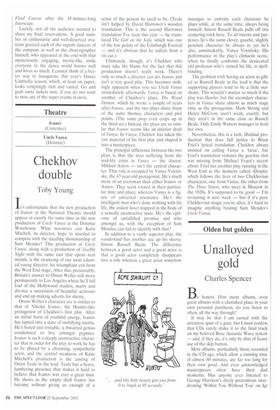Chekhov double
Toby Young
It's unfortunate that the new production of Ivanov at the National Theatre should appear at exactly the same time as the new production of Uncle Vanya at the Donmar Warehouse. What resources can Katie Mitchell, its director, hope to marshal to compete with the dazzling showmanship of Sam Mendes? This production of Uncle Vanya, along with a production of Twelfth Night with the same cast that opens next month, is the swansong of our most talented young director, his triumphant exit from the West End stage. After this, presumably, Britain's answer to Orson Welles will move permanently to Los Angeles where he'll fall foul of the Hollywood studios, marry and divorce a succession of beautiful actresses and end up making adverts for sherry.
Orson WeIles's character arc is similar to that of Nikolai Ivanov, the Hamlet-like protagonist of Chekhov's first play. After an initial burst of youthful energy, Ivanov has lapsed into a state of stultifying inertia. He's bored and irritable, a thwarted genius condemned to live amongst pygmies. Ivanov is such a deeply unattractive character that in order for the play to work he has to be played by a charming, sympathetic actor, and the central weakness of Katie Mitchell's production is the casting of Owen Teale in the lead. Teale has a heavy, lumbering presence that makes it hard to believe that Ivanov was ever a great man. He shows us the empty shell Ivanov has become without giving us enough of a sense of the person he used to be. (Teale isn't helped by David Harrower's wooden translation. This is the second Harrower translation I've seen this year — he translated The Girl on the Sofa, which was one of the low points of the Edinburgh Festival — and it's obvious that he suffers from a tin ear.)
Ultimately, though, it's Chekhov who must take the blame for the fact that this production doesn't really work. There's only so much a director can do; Ivanov just isn't a very good play. This becomes strikingly apparent when you see Uncle Vanya immediately afterwards. Vanya is based on another of Chekhov's plays, The Wood Demon, which he wrote a couple of years after Ivanov, and the two plays share many of the same themes, characters and plot points. (The same prop even crops up in the third act.) Indeed, the plays are so similar that Ivanov seems like an inferior draft of Vanya. In Vanya, Chekhov has taken the raw material of his first play and shaped it into a masterpiece.
The principal difference between the two plays is that the man suffering from the mid-life crisis in Vanya — the doctor, Mikhail Astrov — isn't the central character. That role is occupied by Vanya Voynitsky, the 47-year-old protagonist. He's much more of an everyman than either Ivanov or Astrov. They seem rooted in their particular time and place, whereas Vanya is a figure of universal resonance. He's the intelligent man who's done nothing with his life, the ardent lover trapped in the body of a sexually unattractive male. He's the epitome of unfulfilled promise and who amongst us, with the exception of Sam Mendes, can fail to identify with that?
In addition to a vastly superior play, the wunderkind has another ace up his sleeve: Simon Russell Beale. The difference between a good actor and a great actor is that a good actor completely disappears into a role whereas a great actor somehow manages to embody each character he plays while, at the same time, always being himself. Simon Russell Beale pulls off this conjuring trick here. To all intents and purposes, he's the same clever, gauche, slightly petulant character he always is; yet he's also, unmistakably, Vanya Voynitsky. His performance in the play's climactic scene, when he finally confronts the desiccated old professor who's ruined his life, is spellbinding.
The problem with having an actor as gifted as Russell Beale in the lead is that the supporting players tend to be a little outshone. This wouldn't matter so much if the play was Hamlet, but the secondary characters in Vanya share almost as much stage time as the protagonist. Mark Strong and Helen McCrory aren't weak, exactly, but they aren't in the same class as Russell Beale. Only Emily Watson manages to hold her own.
Nevertheless, this is a lush, libidinal production that does full justice to Brian Friel's lyrical translation. Chekhov always insisted on calling Vanya a 'farce', but Friel's translation restores the gravitas that was missing from Michael Frayn's recent effort. Friel has another play running in the West End at the moment called Afterplay which follows the lives of two Chekhovian characters, one from Vanya, the other from The Three Sisters, who meet in Moscow in the 1920s. It's supposed to be good — I'm reviewing it next week — but if it's pure Chekhovian magic you're after, it's hard to imagine anything beating Sam Mendes's Uncle Vanya.










































































 Previous page
Previous page